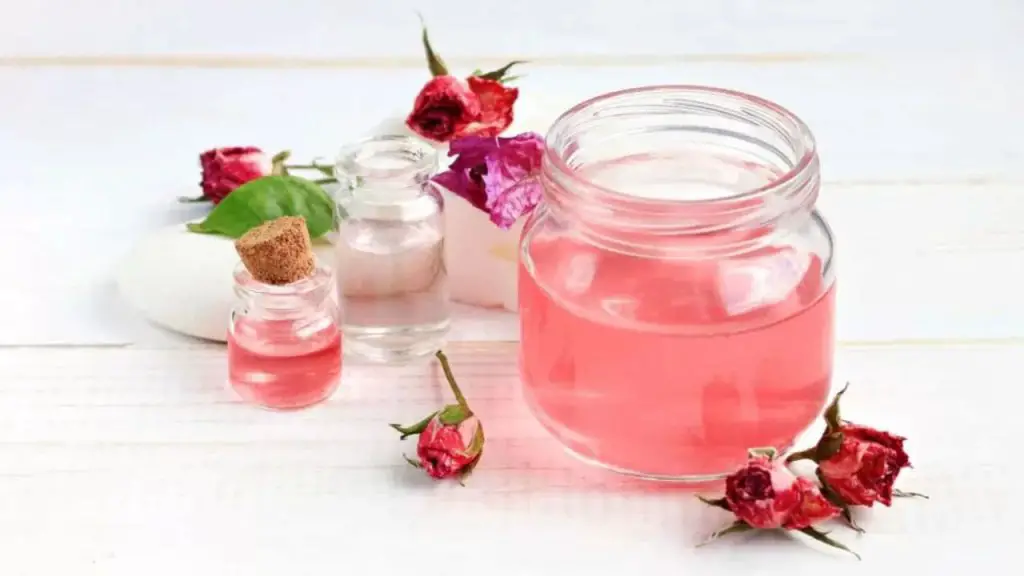Rose water has been used for centuries as a natural beauty remedy. It is said to have many benefits for the skin, such as hydrating it, reducing inflammation, and helping to reduce wrinkles.
But does rose water really do all of these things? And if so, how can you use it to get the best results? Keep reading to find out!
What Is Rose Water And Where Does It Come From?

Rose water is a liquid made from the petals of roses. It has a sweet, floral scent and is often used in perfumes, soaps, and cosmetics.
Rose water is also a popular ingredient in Middle Eastern cuisine, where it is used to flavor baked goods and desserts.
Rose water is made by steeping rose petals in water. The petals release their natural oils and fragrance into the water, which is then distilled to create a concentrated solution. This solution is then diluted with more water to create rose water.
Rose water has a long history of use in both medicine and beauty. In ancient times, it was used to treat various ailments such as headaches and stomachaches.
Today, rose water is still used as a natural skin toner and moisturizer. It is also believed to have anti-inflammatory properties, which makes it an effective treatment for acne-prone skin.
Rose water can be found in many skin care products such as face creams, serums, and masks.
What Does Rose Water Do For Your Skin?
Rose water has been used for centuries in skincare routines and is thought to have a variety of benefits.
Rose water is a natural by-product of the production of rose oil, and it is typically made from red roses. The water itself is not scented, but it does contain rose oil, which gives it its characteristic smell.
Rose water is thought to be beneficial for the skin due to its anti-inflammatory properties. It can help to soothe irritated skin and reduce redness. Additionally, rose water contains antioxidants, which can help to protect the skin from damage caused by free radicals.
Finally, rose water can also help to hydrate the skin and give it a healthy glow. For these reasons, rose water has long been a popular ingredient in skincare products. You can find rose water in toners, face mists, and serums.
It can also be used on its own as a hydrating facial mist. To use rose water on your skin, simply apply it with a cotton ball or pad after cleansing or throughout the day for a refreshing boost of hydration.
Benefits Of Using Rose Water On Your Skin
Rose water has been used for centuries as a beauty product, and it’s no wonder why. Rose water is packed with antioxidants and vitamins that are essential for healthy skin. It can help to boost collagen production, fight free radicals, and even improve your skin’s ability to retain moisture.
As a result, rose water can help to keep your skin looking young and radiant. In addition, rose water has anti-inflammatory properties that can help to soothe irritated skin.
Whether you suffer from acne, eczema, or just the occasional breakout, using rose water on your skin can help to calm and heal your skin.
And because it’s gentle enough for even the most sensitive skin types, rose water is an ideal choice for anyone looking for a natural beauty solution.
How To Use Rose Water As Part Of Your Skincare Routine?
Rose water has been used for centuries in skincare routines and is known for its therapeutic properties. Rose water can be used as a toner, to hydrate the skin, or to soothe irritated skin.
It is also a popular ingredient in DIY skincare recipes. To use rose water as a toner, simply add a few drops to a cotton ball and apply it to clean dry skin.
For extra hydration, you can add a few drops of rose water to your favorite moisturizer or Face serum. To soothe irritation, mix equal parts rose water and aloe vera gel and apply it to the affected area.
You can also find rose water facial sprays that can be used throughout the day to refresh and hydrate the skin. There are endless ways to incorporate rose water into your skincare routine, so experiment until you find what works best for you!
Some Best Ways To Store And Use Rose Water
Rose water has a very subtle, yet pleasant scent that can make any woman feel refreshed and beautiful. It is a great way to add a touch of luxury to your daily beauty routine.
Rose water can be used in many different ways, including as a facial toner, in homemade lotions and creams, and even as a hair rinse.
When using rose water as a facial toner, simply soak a cotton ball in the rose water and apply it to your face after cleansing. You can also add a few drops of rose water to your favorite lotion or cream to give it a light, floral scent.
For an all-natural hair rinse, mix equal parts rose water and distilled water. Pour the mixture over your hair after shampooing and conditioning as usual. The rose water will help to add shine and softness to your hair.
Rose water can be stored in a cool, dark place for up to 6 months. To extend its shelf life, you can refrigerate it or add a preservative such as glycerin or alcohol.
When using rose water, be sure to dilute it with water or other liquids. undiluted rose water can be irritating to the skin.
Whether you use it in your beauty routine or simply enjoy its lovely scent, rose water is a versatile and affordable product that is worth keeping on hand. Give it a try today!
What Are The Potential Side Effects Of Using Too Much Rose Water On Your Skin?
Rose water is a popular ingredient in skincare products, but it’s important to be aware of the potential side effects before using it. Rose water can cause dryness, irritation, and even allergic reactions in some people.
It’s important to test a small area of skin before using it on your face or body and to stop using it if you experience any discomfort.
In addition, rose water can make your skin more sensitive to the sun, so it’s important to use sunscreen when you’re outdoors.
Overall, rose water is generally safe to use on your skin, but it’s always best to err on the side of caution. If you have any concerns, talk to your doctor or dermatologist before using it.
Additional Contents



